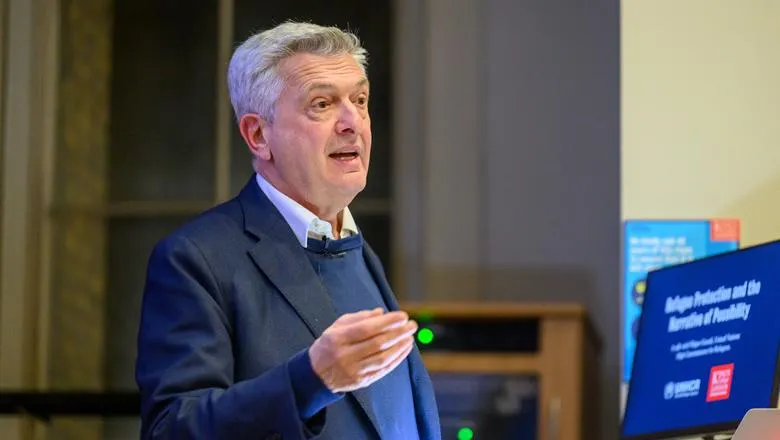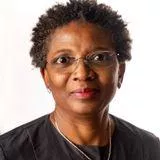“Let's make no mistake, [with] this type of demolition of aid that is going on today, we will lose out, we will lose lives, we will lose opportunities […] This is not reform, it is a retreat that we're witnessing.”
Filippo Grandi, United Nations High Commissioner for Refugees
11 April 2025
UN High Commissioner for Refugees warns that deprioritising international aid will lead to global "insecurity and instability"
In a special address at King’s College London, the United Nations High Commissioner for Refugees Filippo Grandi warned that cuts to humanitarian aid will significantly undermine the international aid system, deepening global “insecurity and instability.”

Discussing humanitarian crises in Ukraine, Sudan, the Democratic Republic of the Congo and beyond, United Nations High Commissioner for Refugees, Filippo Grandi, cautioned that reduced international aid would intensify existing emergencies and miss crucial opportunities to improve stability in regions affected by conflict. His warning came after the US government— the largest donor of humanitarian aid globally—announced a freeze on foreign aid payments pending a wider review, with some European countries reducing aid too.
Grandi emphasised the deep interconnection between humanitarian aid, defence, and security, highlighting a growing paradox in policy priorities. He pointed out that while European nations have increased defence spending in response to potential cuts in US support, they have not shown the same urgency in sustaining international aid. He said, unlike in the area of defence, adequate provisions are not being made to try to create more capacity to deliver aid.
Prime Minister Keir Starmer announced in February that the UK would fund increased defence spending by reducing its internal aid budget from 0.5% to 0.3% of gross national income. The Netherlands has cut its aid budget by 30%, redirecting funds to projects “directly contributing to Dutch interests,” while Belgium and France have made similar reductions, cutting aid by 25% and 37%, respectively.
Grandi urged politicians to be “courageous” and abandon what he called a “narrative of impossibility,” which frames supporting forcibly displaced and stateless populations as an insurmountable problem. He explained that this narrative often leads to the portrayal of refugees and migrants as a burden or threat, complicating the search for workable solutions and enabling governments to “retreat behind this complexity” and focus on controls such as “arming borders” and “limiting arrivals.”
Rather, Grandi underscored what is possible including through a focus on the entire journey of refugees, rather than just the “last border” where they might eventually arrive. Emphasising that refugees are not a burden but potential contributors, Grandi pointed to progressive models in countries like Colombia and Kenya, where innovative policies have allowed displaced populations to integrate and contribute economically. He noted that 71 percent of refugees are hosted in poor or middle-income countries, mostly in a country next to their own.
“Many people, in spite of the perception, don’t really want to put their lives in the hands of traffickers and move on, all of them, to Europe, [..] to North America. Many, if they cannot go back to their homes, would rather stay where they are. To do that, they need opportunities. They need access to services, to some work, not just humanitarian assistance. So, it is important to look at what we can do along the routes,” he said.
To support countries hosting the vast majority of refugees, and inclusion and integration efforts globally, Grandi called for collaboration across multiple sectors, including international, national, and community-based institutions, civil society, the private sector, refugees themselves, and academia.
We all have a role to play in our respective countries to pursue these solutions. Especially when it comes to refugees, to human beings. This is not an abstract phenomenon. It's people and therefore people can cooperate.
Filippo Grandi, United Nations High Commissioner for Refugees
In discussing the role universities can play, Grandi stated that institutions like King’s were integral to “fostering research and reflection” on issues related to humanitarian crises and displacement.
Professor Funmi Olonisakin opened the talk by emphasising that the presence of High Commissioner Grandi and UNHCR colleagues at King’s highlights the transformative role universities hold in the lives of those forcibly displaced.
Their presence is a powerful reminder of our collective responsibility to those who are forcibly displaced and the vital role institutions like ours must play in shaping a more just, inclusive, and compassionate world. Education is transformative. It is the foundation upon which agency is restored, communities are rebuilt, and individuals are empowered to contribute meaningfully to society.
Professor Funmi Olonisakin, Vice President (International, Engagement & Service)
In 2024, King’s was awarded University of Sanctuary status in recognition of its commitment to being a place of safety, solidarity, and empowerment for those forcibly displaced from their home countries.
Over the past nine years, the university has harnessed its expertise in education, remote learning, research and established partnerships to create meaningful opportunities for displaced students and academics. A key example of this commitment is the King’s Sanctuary Scholarships programme, which has already supported over 70 students. Last year, King’s further demonstrated its dedication by allocating an additional half a million pounds annually over the next three years to fund scholarships for displaced students.
Watch High Commissioner Grandi’s talk Refugee Protection and the Narrative of Possibility:
Find out about King’s Sanctuary Programme.

